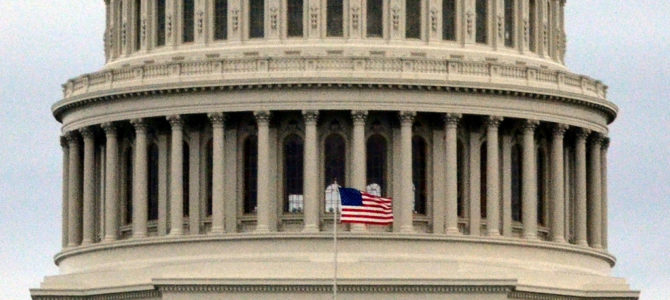
After the House Ways and Means Committee passed the Tax Cuts and Jobs Bill, Republicans in the U.S. Senate released their own tax reform proposal last week. Some of the Senate proposals are improvements, but some are worse than the House version.
Several GOP senators have already threatened not to support either the Senate or the House version. Since the GOP has a very thin majority in the Senate, people can’t help but wonder whether the Senate will become the burial chamber for GOP tax reform like it was for the Obamacare repeal.
The Major Differences Between the Bills
While the House bill will cut the corporate tax rate from 35 percent (one of the highest among the developed nations) to 20 percent immediately, the Senate bill wants to delay the cut for one year, a terrible idea. Many economists and politicians on both sides of the ideological divide have long recognized that our corporate tax rate isn’t competitive and has hindered America’s economic growth.
There are many benefits to cutting the corporate tax rate: stimulating long-term economic growth, increasing American businesses’ competitiveness, attracting entrepreneurs and new investments to U.S. soil, and higher wages and living standards for American workers. Yet corporate tax cuts can be a hard sell to many ordinary Americans because businesses need time to plan and adjust to tax code changes, so people won’t see or feel some of these benefits immediately.
“Delay is the deadliest form of denial,” says British naval historian C. Northcote Parkinson. Delaying will not win over any additional supporters, but only add uncertainty, which in turn delays businesses’ decisions. The GOP needs to learn that if it’s the right thing to do, do it now.
On the personal tax side, the Senate bill’s biggest improvement over the House bill is the total repeal of the state and local tax deduction, while the House bill caps such deductions at $10,000 for property taxes only. The rest of America shouldn’t have to subsidize high-tax progressive states by shielding voters in those states from the cost of their own governments. Another improvement in the Senate bill is that rather than increasing the tax rate for the highest earners (couples earning more than $1 million or individuals earning more than $500,000) like the House bill proposes, the Senate bill slightly lowers the highest marginal tax rate from 39.6 percent to 38.5 percent.
Major Failures in Both Bills
Yet just like their House colleagues, it seems GOP senators are incapable of putting out a clean and principled bill. Every good idea they present is usually followed by a couple of bad ones. For example, it’s well known that the mortgage interest deduction (MID) is a bad policy. It inflates housing prices and incentivizes the well-to-do to buy bigger and more expensive houses. That’s why households earning more than $100,000 receive almost 90 percent of the benefits. Yet the Senate bill keeps the existing MID as is and the House bill caps it at $500,000. No one has the courage to simply repeal MID right away.
The Senate bill also fails to repeal the death tax, which means rather than finding the most productive way to deploy their hard-earned capital, lawyers and accountants will continue to help the rich shuffle their wealth in much less-productive ways to avoid paying a big tax bill in the end. Sen. Bob Corker (R-TN) notes these bad ideas serve no useful purpose other than “buying off” special-interest groups.
When will the GOP wake up to the reality that delaying the corporate tax cut, failing to repeal the death tax, and keeping deductions here and there won’t win over progressives? They will call any GOP tax reform bill a sell-out to the rich. So it’s better for the GOP to put out a tax reform bill that reflects the conservative principles of limited government and individual freedom as a starting point, rather than putting out half measures that won’t win over Democrats but will certainly disappoint the GOP base.
The Senate GOP Has a Math Problem
The Senate GOP has a thin majority. To pass any kind of bill, the majority leader, Mitch McConnell, can only afford to lose two GOP senators who will vote “No.” That’s how the Senate killed the Obamacare repeal when three GOP senators—John McCain, Susan Collins, and Lisa Murkowski—broke away from the majority.
For the tax reform bill, the Senate GOP faces a similar math problem. Sen. Rand Paul from Kentucky was injured by an attack from his neighbor and may not be able to vote consistently for some time, depending on his health. Even if he did show up, he may vote “no” because the tax reform bill doesn’t improve enough for him.
Collins, who has shown little belief in “limited government,” is another likely “no” vote because the current bill has gone too far for her taste. Senators McCain and Flake, both from Arizona, and Sen. James Lankford from Oklahoma all voiced concerns about how the tax reform bill may worsen the United States’ national debt. I appreciate their concern, but wish they could see that the only way to address the debt problem is to cut spending, not to kill tax reform. If any one of them decides to vote “no,” the Senate will become a burial chamber for GOP’s tax reform.
Then there’s the Roy Moore problem. The Alabama Republican Senate candidate faces public accusations of sexual misconduct, and many have called for him to remove himself from the upcoming special election on December 12. So far, he refuses. Alabama’s governor insists on not postponing the special election. Whether Moore removes himself or not, in this post-Harvey Weinstein world, I don’t see any likelihood of him winning the special election. If Moore’s Democratic opponent wins, only one “no” vote from another GOP senator will be sufficient to kill the tax reform bill.
The Dire Consequences If Tax Reform Bill Fails to Pass
Both the House and the Senate GOP need to realize that if they fail to pass tax reform, they will face dire consequences. The stock markets will crash, because stock markets are forward-looking and so much of the anticipated benefits of tax reform have already been priced in. Investors will sell if the tax reform bill fails to pass.
We’ve already seen an early indicator of this when the Senate announced its tax reform bill last Thursday. The major U.S. stock market indices promptly dropped. Investors saw the big differences between the House and the Senate’s bills, and they rightfully worry that either they are going to get a final bill that is so watered down that it won’t yield the kind of benefits they anticipated, or they will not get any tax reform at all.
Failing to pass tax reform will mark the end of Republican Party as we have known it. Repeated legislative failures will show that the GOP has no ability to govern. Almost all GOP members of Congress campaigned on repealing Obamacare and tax reform. Almost all of them professed during their campaigns their beliefs in limited government and individual freedom. But their legislative failures show that they are either incapable of or lack the courage to propose principled solutions once in office.
The GOP base already feels a strong sense of betrayal. That’s why they chose to send a non-career politician to Washington in 2016. One of the reasons Democrats swept the elections in Virginia a few weeks ago was that the GOP has accomplished no legislative successes to excite the base and get out to vote.
The next couple of weeks will be key not only to the success of GOP’s tax reform bill, but also to the future of the GOP. If the Senate becomes the burial chamber for the tax bill like it was for the Obamacare repeal, it will also bury the GOP as we have known it.
An identification has been added postpublication for C. Northcote Parkinson.









